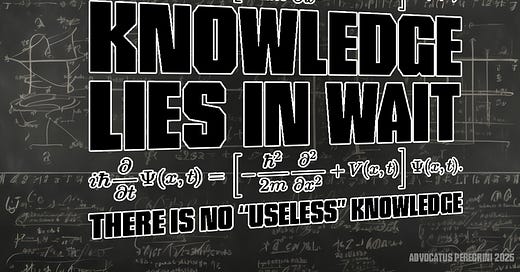This will be very short, but, I think, very important. As a writer, be it in my legal work, my fiction, my essays, or my poetry, I have an axiom I keep top of mind. “Never waste your reader's time.”
So here it is. Write it on you mantels and doorposts.
Knowledge lies in wait.
There is no such thing as useless knowledge. You learn something, you remember it, and someday, the moment of its utility may come. No matter how obscure, how specialized, everything you learn lies in the high weeds of your mind, awaiting its moment to attack a problem.
I like Keith Hernandez. He's a very good baseball commentator. But the other day he said a foolish thing, as people who have dedicated their lives to becoming an elite practitioner of a difficult skill tend to do when they venture outside their specialty. He said, “I had to learn about square roots. What good does that do me, now? A useless waste of my time!”
If I need someone in the mid 1980s to play first base, or get a clutch hit in the playoffs, Keith Hernandez is first on my list of people to call. But he's “off base” here.
Let's say, Keith, that you need to store something that you know will take up 25 square feet of space. How will you know how big that room needs to be? If you know what the square root of 25 is, you know how wide and how deep. You won't buy a space that's too large, or too small. Add in a few feet on a side to move around it, and make sure the door is big enough, and the problem is solved. Sure you could do it by trial and error, but that could end up wasting a lot of time, effort, and possibly money.
Do you know what this is?
This is one of Schrodinger's Equations. It's important to understanding quantum mechanics. Don't worry, I'm not going to go into the workings of what, to most of you, looks like an explosion in a math factory. I promised to keep this short.
Knowing how this equation works is useful to me, because I'm one of those odd bodkins who studies quantum mechanics and isn't even being paid to do so. But its useful to me in another way – one more important and useful every day.
Let's say I lost all interest in quantum mechanics. I'll never even think about it again. Would having spent time and effort learning to understand this equation have benefited me?
Yes. Certainly. By struggling with this, I got better at math, but more importantly, I got better at struggling. Mental muscle was built. The habit of not giving up at the first frustration was reinforced.
It also opened up other areas of understanding. I can understand other things, because I understand this thing. Over time, your knowledge base grows exponentially. And you become mentally adept enough to use what you know.
There is no “useless knowledge.” Now go learn something “useful.” Anything at all.






P.S.
Of course, at the time you are being required to learn many things that you will later consider useless, there was no way of being certain where life would take you. A teacher being confronted with a class has no way of knowing which one will be a doctor, or an engineer, or a first baseman. So the best that can be done is to give everyone a broad base of knowledge, but more importantly, we should give the little snotlings the habit of learning things, especially things that they might find difficult at first. Again, sometimes the habit, the discipline is more important than the substance.
And this much is certain: If children are not taught the basics of mathematics, for example, and how to approach a mathematical problem early on, careers that require those skills will be forever closed to them. If you learned to hate math early on due to defective pedagogy, you avoid it later in life. And half the world of work is closed to you. Let's not kneecap the kids out of the gate.